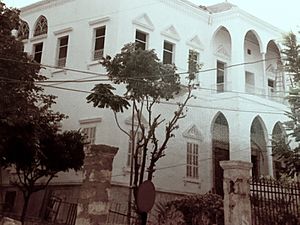Saadé Family facts for kids
The Saadé family is a well-known family from the city of Latakia in Syria. They are Greek Orthodox Christians, which is a branch of Christianity with deep roots in the Middle East. The family owns two special places where they grow grapes for wine: Château Marsyas in Lebanon and Domaine de Bargylus in Syria. Even with challenges in the Middle East, they have kept their vineyards running.
Contents
A Look Back: History and Roots
The ancient city of Latakia, where the Saadé family comes from, was once called Laodicea. It was named by King Seleucos I Nikator after his mother and daughter. The city has a long history, built on the site of an even older village.
The Saadé family belongs to the Orthodox Christian community of Antioch. This community is one of the oldest Christian groups in the East, alongside those in Constantinople, Alexandria, and Jerusalem.
For many years, the Saadé family were successful merchants, business owners, and large landowners in Syria. They were known for treating the farmers who worked on their lands with respect and fairness. This was different from how some other large landowners acted at the time. The family also showed a modern way of thinking for their era, as both men and women in the family owned property.
Key Family Members and Their Contributions
Many important people came from the Saadé family. Some of them include Elias Saadé, Mikhaïl Saadé, and Gabriel Saadé (who lived from 1854 to 1939). Gabriel's sons, Wadih, Edouard, and Rodolphe, also became very important.
In 1840, Elias Saadé worked to improve how olive trees were grown and how olive oil was made in the Syrian coastal area. His son, Mikhaïl Saadé, was a respected leader in Latakia. He even hosted Midhat Pasha, a powerful Ottoman governor, in his home. Later, some family members like Gabriel Saadé and his sons Wadih and Edouard faced serious accusations from the Ottoman Empire, but they were not harmed.
Gabriel Saadé (1854-1939) was another important landowner and trader. His family business, Gabriel Saadé & fils, was one of the first in Syria to open a cotton ginning station in the 1920s. This machine helped separate cotton fibers from their seeds.
In 1943, Wadih Saadé, Gabriel's grandson, became a member of the Syrian parliament. He had also been a vice-president in the Alawite State, which was set up when France governed Syria.
Another grandson, Edouard Saadé, studied agriculture in France. Following his lead, his cousin Habib Saadé bought land in Cyprus in 1922 and started growing tobacco, just like it was done in Latakia.
By 1907, four members of the Saadé family were listed among the top eight merchants in Latakia, showing their strong presence in the city's trade.
Rodolphe Saadé (1900-1958), the youngest grandson, was a leading merchant and industrialist. He believed that Syria's wealth came from farming and that industries should be based on it. He was a pioneer, even suggesting to the Syrian president that a modern port be built in Latakia. He also served as the honorary consul for the Netherlands in Latakia.
The Saadé family also owned the "Régie des Tabacs et Tombacs" in Latakia, which had the sole right to sell the famous local tobacco. They also helped create the mountain resort of Slenfeh, a popular vacation spot for people from Latakia and Aleppo.
Modern Times and New Ventures
Johnny Saadé, Rodolphe's son, decided to focus the family's businesses on winemaking and tourism. He lives in Beirut with his wife. His wife's father, Louis Ziadé, was a lawyer and a member of the Lebanese parliament.
Another notable family member was Gabriel W. Saadé, a Syrian historian. He greatly helped us understand the ancient city of Ugarit and founded the archaeological museum in Latakia. He also helped start the Orthodox Youth Movement in Lebanon and Syria, which boosted culture and education in the Orthodox community.
Claire Saadé, the mother of the famous Egyptian actor Omar Sharif, was also a member of this family.
For the past two centuries, the Saadé family has played a big role in the Orthodox community of Latakia. They have made many donations, like Elias Saadé rebuilding the St. Nicholas church in 1845. A Saadé family member has always led the Orthodox community in Latakia for the last two centuries.
Growing Grapes: The Vineyards
The Saadé family started their two vineyards in 1997. Johnny Saadé and his two sons, Karim and Sandro, founded Domaine de Bargylus in Syria and Château Marsyas in the Beqaa Valley in Lebanon. They studied the soil and climate carefully, and the first grapevines were planted in 2003.
The first wines from Bargylus were made in 2006, and from Château Marsyas in 2007. The family has very strict rules to make sure their wines are of the best quality.
Karim and Sandro Saadé have managed to keep the Bargylus vineyard producing wine even during the war in Syria. They run the estate from Beirut because they haven't been able to visit it since the conflict began.
In 2020, a large explosion happened in Beirut. It destroyed their offices and badly injured Johnny Saadé and his son Sandro. Despite these challenges, the family continues their work in winemaking.


